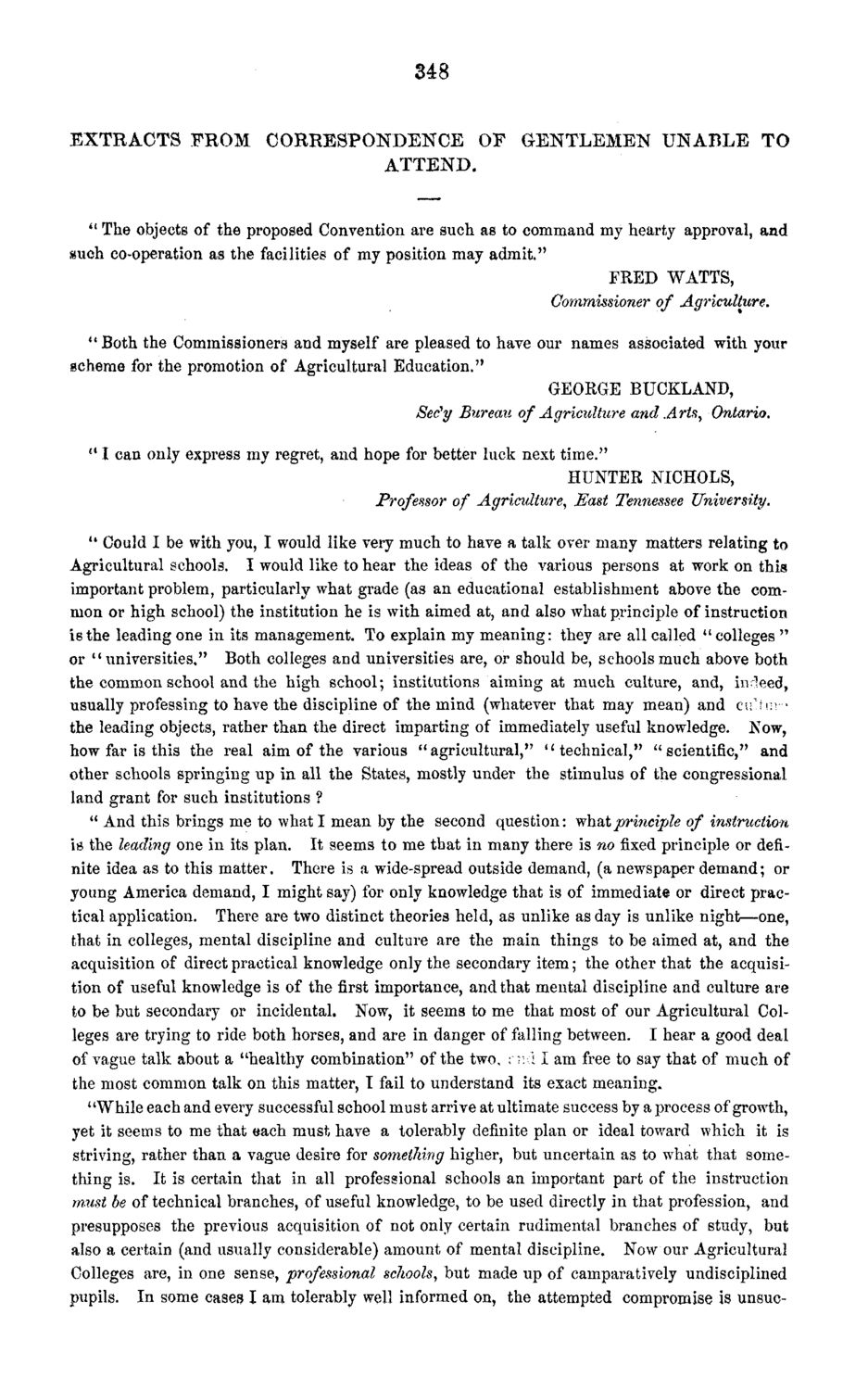| |
| |
Caption: Board of Trustees Minutes - 1871
This is a reduced-resolution page image for fast online browsing.

EXTRACTED TEXT FROM PAGE:
348 EXTRACTS FROM CORRESPONDENCE OF GENTLEMEN UNABLE TO ATTEND. " The objects of the proposed Convention are such as to command my hearty approval, and such co-operation as the facilities of my position may admit." FRED WATTS, Commissioner of Agriculture. "Both the Commissioners and myself are pleased to have our names associated with your scheme for the promotion of Agricultural Education." GEORGE BUCKLAND, Sec'y Bureau of Agriculture and Arts, Ontario. a I can only express my regret, and hope for better luck next time." HUNTER NICHOLS, Professor of Agriculture, East Tennessee University. " Could I be with you, I would like very much to have a talk over many matters relating to Agricultural schools. I would like to hear the ideas of the various persons at work on this important problem, particularly what grade (as an educational establishment above the common or high school) the institution he is with aimed at, and also what principle of instruction is the leading one in its management. To explain my meaning: they are all called " colleges " or "universities," Both colleges and universities are, or should be, schools much above both the common school and the high school; institutions aiming at much culture, and, indeed, usually professing to have the discipline of the mind (whatever that may mean) and cw'tnrthe leading objects, rather than the direct imparting of immediately useful knowledge. Now, how far is this the real aim of the various "agricultural," "technical," "scientific," and other schools springing up in all the States, mostly under the stimulus of the congressional land grant for such institutions ? " And this brings me to what I mean by the second question: what principle of instruction is the leading one in its plan. It seems to me that in many there is no fixed principle or definite idea as to this matter. There is a wide-spread outside demand, (a newspaper demand; or young America demand, I might say) for only knowledge that is of immediate or direct practical application. There are two distinct theories held, as unlike as day is unlike night—one, that in colleges, mental discipline and culture are the main things to be aimed at, and the acquisition of direct practical knowledge only the secondary item; the other that the acquisition of useful knowledge is of the first importance, and that mental discipline and culture are to be but secondary or incidental. Now, it seems to me that most of our Agricultural Colleges are trying to ride both horses, and are in danger of falling between. I hear a good deal of vague talk about a "healthy combination" of the two, ; 1.11 am free to say that of much of the most common talk on this matter, I fail to understand its exact meaning. "While each and every successful school must arrive at ultimate success by a process of growth, yet it seems to me that aach must have a tolerably definite plan or ideal toward which it is striving, rather than a vague desire for something higher, but uncertain as to what that something is. It is certain that in all professional schools an important part of the instruction must be of technical branches, of useful knowledge, to be used directly in that profession, and presupposes the previous acquisition of not only certain rudimental branches of study, but also a certain (and usually considerable) amount of mental discipline. Now our Agricultural Colleges are, in one sense, professional schools, but made up of camparatively undisciplined pupils. In some cases I am tolerably well informed on, the attempted compromise is unsuc-
| |